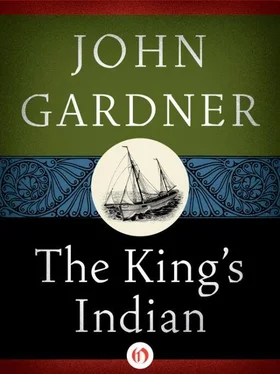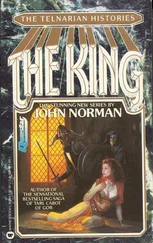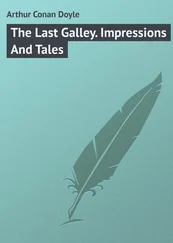At the crest of the hill, on this particular occasion — the occasion I’ve set out to recount to you — I tug at the reins, he resists, I tug harder, and we stop. I gaze at a world transmogrified: glowing green fields, woodlots with trees as gray as bones, bright houses and barns, and, winding between them, the rich, gravy brown of the road. The horse turns his head. He thinks I’m a fool, and he’s correct.
Then comes the wind. We can see it from ten miles away, coming at us, moving across the whole world like a thrasher’s scythe. Where its cutting edge is, trees burst to life with the shudder of an infant first sucking in air, and behind, in the swath of the wind, even oak trees bend and buckle, and the willows are in motion like the sea. Then rain slams down on the hot, cracked earth. It kills more things than it nourishes, no doubt. Down in southern Illinois, whatever can make it through the ravages of spring to the time when the heavy, wet heat moves in, crowding every meadow and marsh with green — the time when the rattlesnakes come out on the rocks in dry, brown creeks to sun themselves (coil on coil, their hatchet heads lifted to watch you pass) … the deadly hot summer when farmers get up before dawn to hoe bottomlands, and work there only till the dew’s off the ground, then quit, which happens when the sun’s shoulder-high … in summer, I was saying …
The wind. Let me see.
We stood there in the road, watching, and it seems I fell into a momentary trance. The storm came plunging northward toward us, and it never even crossed my mind that I ought to seek shelter. Grass, birds, underbrush creatures around us were hushed and motionless, hugging the ground, waiting as they do when an eagle’s been sighted. And then, not one at a time but simultaneously, like angels arriving out of nowhere in a vision, three enormous black cyclones appeared, maybe twenty miles away, and they came along, crazily swaying like wild black savages, dancing where the scythe had passed.
The world came awake, whispering alarm at the first little puff of wind, and old Shakespeare bolted.
3
In many ways horses are wiser than men, and so old Shakespeare proved that afternoon. He shot straight forward, downhill toward the storm, and just in the nick of time I saw what his plan was. Some fifty yards from where I’d paused to consider the beauty and grandeur of Nature in her rage — some fifty yards from where, no doubt, my absentminded stare would soon have plunged me headlong back into the buzzing, blooming confusion — stood two old gateposts of hand-hewn stone, which supported enormous black iron gates of the kind one sees mainly at the entrances to graveyards. The gates were wide open (they were normally locked with a padlock and a length of rusty chain), but, closed or open, no sensible creature in all southern Illinois, except a horse, would have ventured up that driveway. When I saw the turn coming, I threw myself violently left, snatching at the seat-rail and clinging, and somehow remained with the carriage, which remained with the horse. The world fell silent, as if we’d crossed from one sphere of reality to another. The carriage wheels, moving through deep, lush grass, made not even a squeak; old Shakespeare’s hooves were the hooves of a dream horse: He might have been rushing past planets toward deepest space. Above us, huge beams of old trees interlocked, and what little light there was left in the world came in needles. So we rode for what might have been hours, silent as phantoms in that silent lane. It was not, of course, hours. Two minutes, perhaps.
I am not a man given to foolish superstitions, nor am I in the ordinary sense religious, though my father was a Presbyterian minister and I begin to suspect I will carry his habits of speech to my grave, for their inherent felicity if nothing else. Much less am I a person of easy credulity. I have heard too much gossip in my fifty-four years to give credence to even a little of it; and I have seen too often, in my chosen profession, the errors of other men’s eyes and ears and chests. I diagnose on the basis of evidence, and that which I cannot understand I respect and ponder.
Nevertheless, as I have said, I would not personally have chosen that lane, even to escape a midwestern tornado. There were stories— nebulous, disquieting. Things had been seen, apparitions or whatever, which so bothered those who believed they’d seen them that they preferred to remain unspecific. I had treated certain patients whose physical condition suggested to me (though I would swear neither that it was true nor untrue) that something up there on that hill was decidedly wrong. I had no particular idea what it was and, believe it or not, no great interest in learning. Whatever evil the place entertained, it did not come aggressively out to us, but waited, quiet and contented, like a sleeping dragon. There were of course some who were more curious than I. Of those who went up to the house to taunt it, poke it with a stick to learn what unnatural anger they could rouse, some came back baffled, having learned and seen nothing; others came back troubled, uncommunicative. Some who swore they’d seen nothing whatever did not seem to me entirely convincing.
“Strange business,” I’d say to myself, and I’d hook my glasses back over my ear, dismissing it. “Let him sleep with the lamp on, if the boy insists,” I would say to the mother. “We must never be overly contentious in dealing with Nature.” And I’d leave her with pills for the young philosopher’s sedation.
Shakespeare, however, took a princely disinterest in my reasonable aversion or my reasons for it. Any port in a storm was his philosophy, and I (with the thunder now crashing above us, and the rain slamming down, bringing sticks and leaves) was in no real position to debate with him.
4
Then, ahead of us, there was a widening patch of sea-green sky full of lightning flashes — the world was howling, everything was churning, writhing, screaming, obscured to the vagueness of things seen under water — or things wrapped in fire — by the plunging, blood-dark rain. At the center of the patch of unnatural light stood the house we’d all of us heard of, and some, as I’ve said, had reportedly seen. Smaller, humbler than I would have expected. No work of evil men or devils is finally impressive compared with the vastness of the universe or the hopeful imagination. And yet it was a fine old house, for southern Illinois. Tall and morose, with heaven knows how many rooms, and a soaring, blunt tower that swayed like something alive in that violent wind. Beside the tower lay a graveyard, its tombstones crooked and skewbald as an old wolf’s teeth. In the house there were no lights, no signs of habitation.
We hurtled silently toward it, alien creatures in the storm’s loud tumult. I thought nothing, smashing my hat to my head, soaked to the bone like a drowning man. Then, little by little, I became aware of the horse’s indecision. Not fear of the great, dark house, but simple bafflement. The house stood alone — one moment blazing like a jewel in the lightning’s flash, the next moment invisible, a void. Alone! No barn, no shelter for four-legged creatures, however well-meaning their hearts or adept their minds!
I tugged at the reins and, surprisingly, he responded. The nightmarish gallop slowed down toward reason, and in a moment I was guiding him, controlling his terror. His headlong rush dropped down to mere hurry, then dropped down further to a considered trot, and finally, after a struggle of our two uncertain wills, to something resembling a walk. I snatched off my glasses so that I could help him see, folded them carefully away in my pocket, and guided him along the graveyard fence to a rough, natural wall, almost cave, defended by bedraggled hemlocks and pale, square boulders. There, where the wind whipped over us, harmless, and the rain, flying by, left us almost untouched, I jerked the reins with my stubborn human intelligence — whatever he might think, I was sure I was right — and he deferred to me and stopped. After a moment I got down. The earth felt strange, unnatural to my feet; my soaked trousers clung, chilly, to my skin; my rear end was bruised and sorrowful, and I could have drawn you, by feeling out my fiery pains, a scheme of the human muscle system. I went around to his head. He was wheezing like a steam engine, and crying. It’s not generally recognized that horses cry; but I give you the word of a medical doaor and veterinarian that more than rain was streaming down those coal-black cheeks.
Читать дальше











![John Bruce - The Lettsomian Lectures on Diseases and Disorders of the Heart and Arteries in Middle and Advanced Life [1900-1901]](/books/749387/john-bruce-the-lettsomian-lectures-on-diseases-and-disorders-of-the-heart-and-arteries-in-middle-and-advanced-life-1900-1901-thumb.webp)
